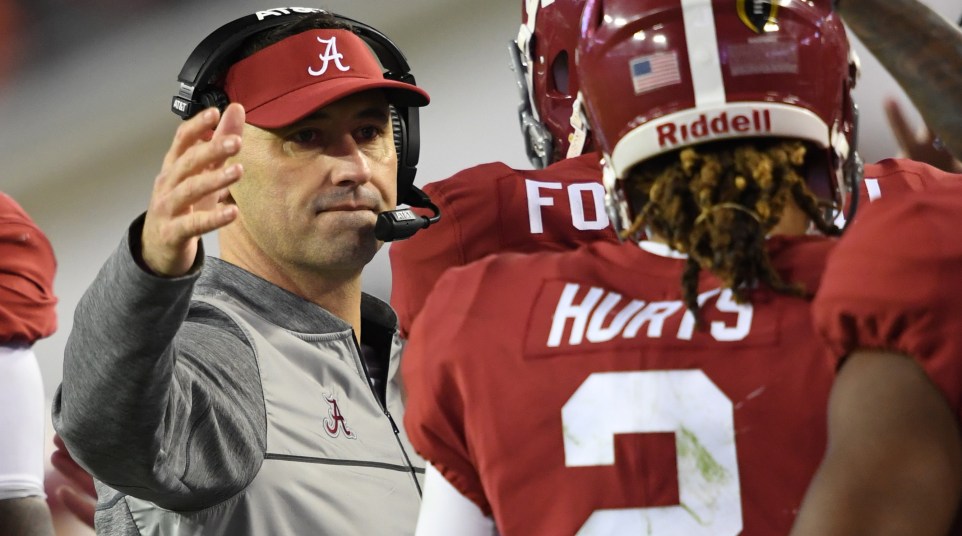
Alabama's loss shows pitfall of CFP and why expanding to 8 would destroy college football as we know it
As college football’s hunt for a champion has emerged from the dark days of random, unrelated claims to a mythical title to a BCS No. 1 vs. 2 showdown and now to a four-team CFP, in theory, there should be clarity. The best team earns the title on the field. And if anybody has a problem with that theory, it’s that there aren’t enough best teams on enough field. If only the Playoff were expended — make it eight teams, or even 16. Then, we’ll finally have a settled champion. Well, if the CFP has taught us anything, it’s that we have no idea what we’d have.
In three CFP events, the champion has been the No. 4 team once and the No. 2 team twice. In case the point hasn’t been made crystal clear, there isn’t much difference between No. 1 and No. 4. Certainly, on a given day No. 4 can beat No. 1 — current statistics would suggest roughly 33 percent of the time. And because of that, the CFP has been most unfair to the No. 1 team in the nation.
College football has been distinct from college basketball and the various pro sports because being No. 1 is more than a point of pride — it’s the path to a national title, or perhaps it used to be. In a byzantine era of various polls, being No. 1 was really the only championship claim in town.
In the BCS days, it really didn’t matter if you were No. 1 or No. 2, but you had to be one or the other. Of course, now, the only focus is making the playoff. So far, No. 4 has been a deserving candidate — a one-loss Ohio State team that played its way to the title, and one-loss Oklahoma and Washington teams that, while each handily lost their semifinal game, were teams reasonably deserving of a title. But the Playoff has hurt No. 1.
Whether it was a one-loss Alabama team that clearly led the NCAA field in 2014 or undefeated Clemson in 2015 or undefeated Bama in 2016, these teams were the class of college football all year long — to only get dumped into a four-team blender at the end of the year. It’s almost a coin toss whether No. 1 can win two more games or not. So far, the coin has come up against No. 1 — which at some point, will devalue the whole enterprise.
Maybe at the point of expansion. Washington having a shot at the title didn’t seem peculiar, but what about No. 8 Wisconsin? A 10-3 team playing for a shot at the title? Or No. 16 West Virginia? Sure, you think, it wouldn’t matter. No. 1 would carve up No. 8 or No. 16. Sometimes, sure. But not always.
Take a look at the FCS playoffs. In the past decade the No. 1 team has won two national titles. Four of the 10 years, the national title winner has come from outside the top four. So in other words, in the FCS, nobody cares who the best team is, it matters only if you’re one of the top 16, at which point, it’s a free-for-all.
Some people will like a free-for-all. The year after I graduated, my alma mater, Western Kentucky University, won the FCS title. The entered the playoffs as the No. 15 team in the country. And they got hot at the right time. But they weren’t a great football team. They used the regular season as a practice round. They lost 14-0 to Western Illinois, and 38-13 to McNeese State. They eventually beat both teams in the playoffs, the latter for the national title. Do we really want a system where a team with three losses gets a playoff rematch for a national title against a team that beat it by 25 points earlier in the season?
If your answer is “yes,” realize that choice is gutting the tradition of the SEC. The CFP, and certainly expansion of the CFP, cost history an undefeated champion last night. In time, it will likely cost the integrity of regular season matchups. Who cares if you lose the Iron Bowl, if you get seeded into the playoffs and meet again in three weeks? Does Tennessee vs. Florida matter if an SEC East title isn’t a prerequisite for playing for a championship? Only in the team media guides.

Credit: Marvin Gentry-USA TODAY Sports
The future of college football is a longer playoff. It’s more games that mean less, and the devaluation of the regular season until it’s the equivalent of college basketball. (Do casual fans even turn on a game before late February?) It’s all just a warm-up for the annual Big Dance. But there won’t be any Lehighs or Florida Gulf Coasts, no Cinderella runs from Butler to amaze the fans — just mediocre teams ruining the achievements of the best squads in college football, in the name of a few more games and a “clear” champion.
The road to Hell is often paved with good intentions. For the SEC, the road to ruination is paved with a College Football Playoff, and the bigger the Playoff, the wider the road to being just another group of teams slogging through more-or-less meaningless games into the late season spectacle. Today’s it’s Alabama fans who will tell you that parity isn’t a good thing for the top dog. Tomorrow, it might be the whole league.
